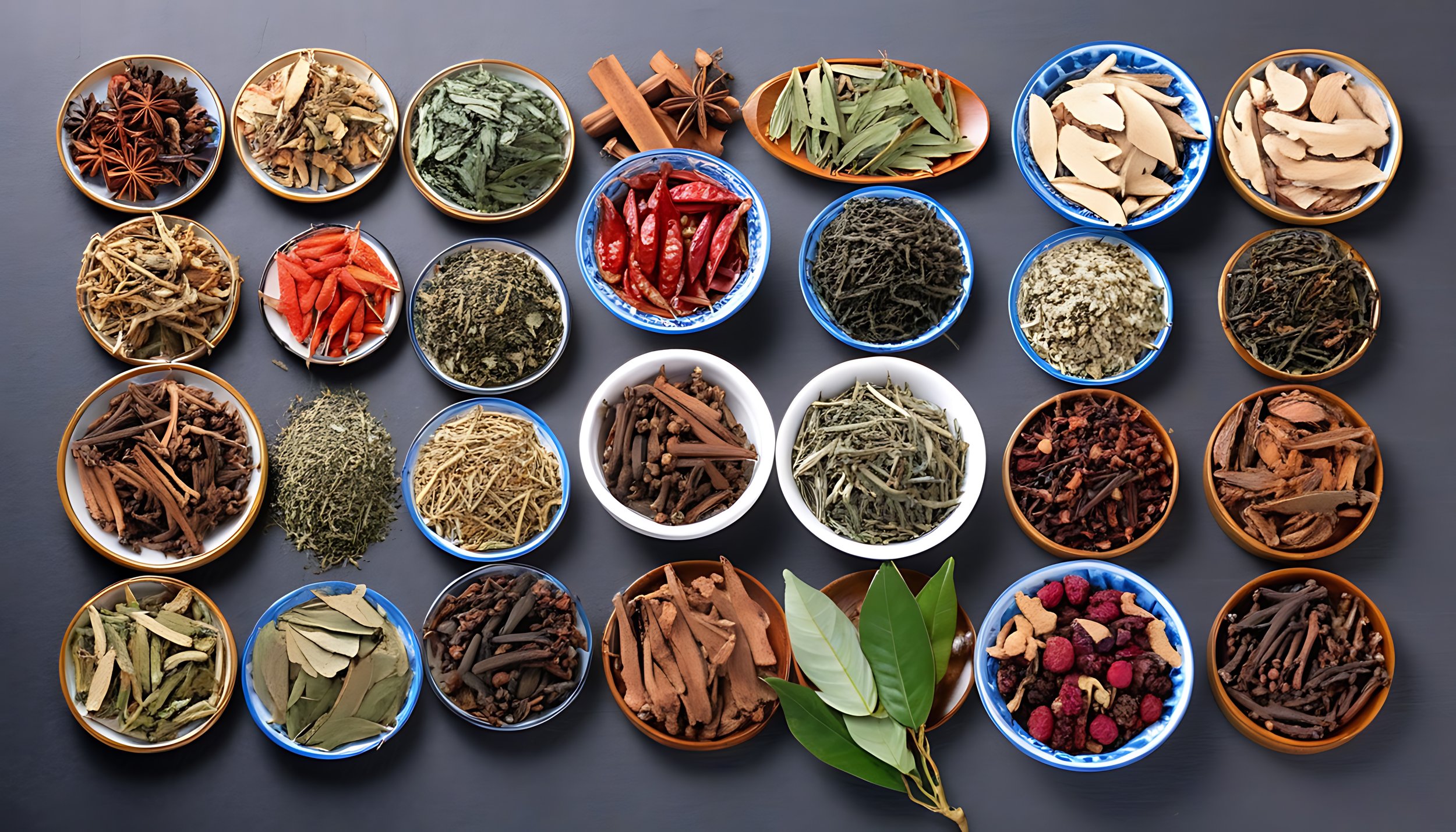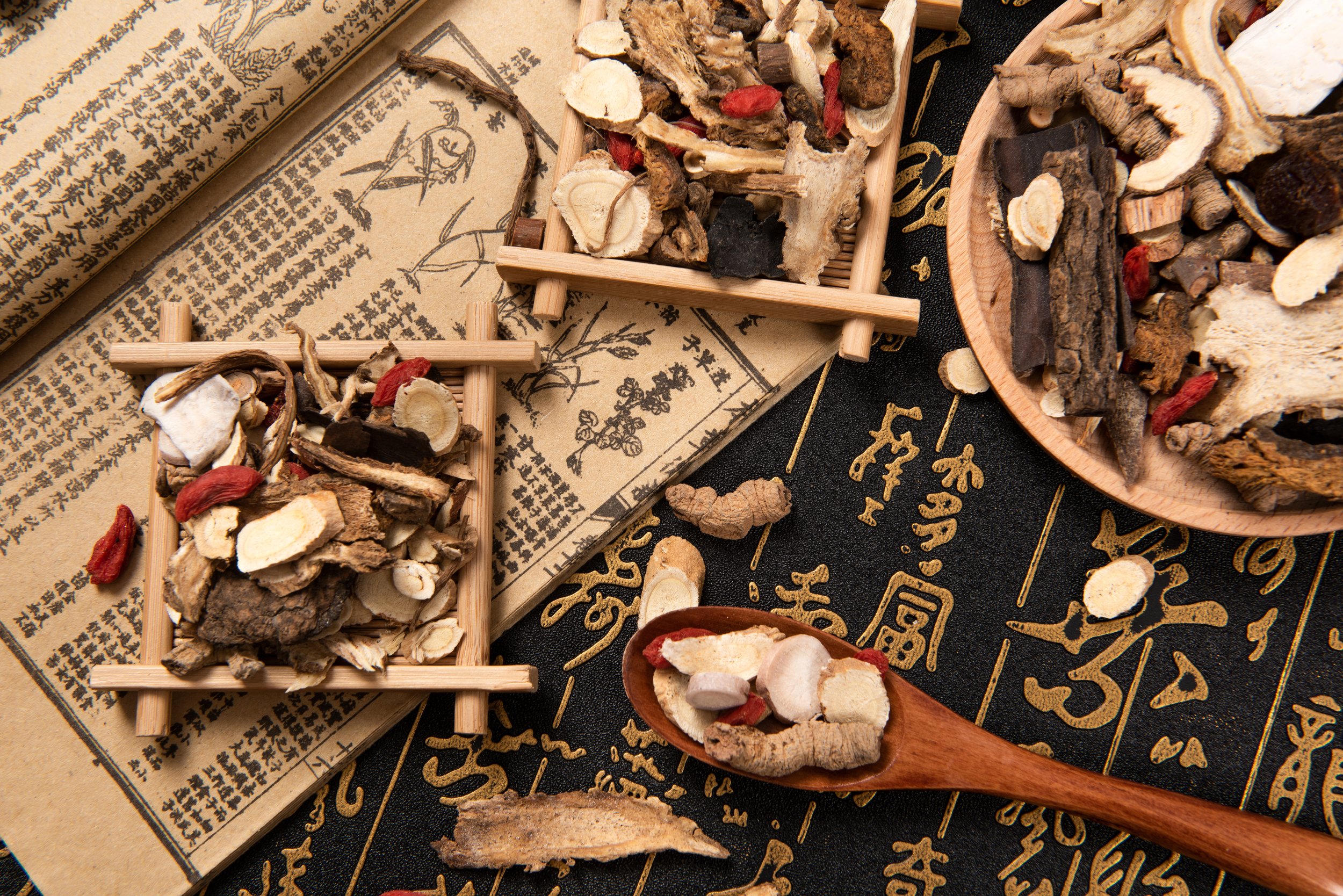Herbal Medicine
A Brief Introduction

What is Herbal Medicine?
Traditional Chinese Herbal Medicine is a key component of Traditional Chinese Medicine (TCM) that uses a variety of natural substances—mainly plant-based, but sometimes including minerals and animal products—to restore balance and promote health. This practice dates back thousands of years and is built on the principle of treating the root cause of disease rather than just its symptoms.
The Wellspring Integrative Approach
Wellspring Health uses traditional Chinese herbal medicine alongside Conventiional medicine in an integrative approach. This combination can enhance treatment outcomes, manage side effects of conventional treatments (like chemotherapy), and provide additional support for chronic or complex conditions. We love science and we love working with conventional medical Doctors. This approach combines the strengths of both systems, offering a broader range of treatment options and emphasizing the prevention of disease as well as the treatment of existing conditions.

Principles of Traditional Chinese Herbal Medicine:
Traditional Chinese herbal medicine is based on TCM theories that view health as a state of dynamic balance between the body, mind, and environment. The goal of herbal therapy is to correct imbalances in the body’s energy (Qi), blood, and organ systems.
Key concepts include:
Qi, Blood, Yin, and Yang:
Qi: The vital energy that flows through the body.
Blood: Nourishes tissues and supports mental and physical activity.
Yin: Represents cooling, nourishing, and stabilizing aspects of the body.
Yang: Represents warming, activating, and energizing aspects.
The Five Elements Theory: The body’s organs and functions are associated with the Five Elements: Wood, Fire, Earth, Metal, and Water. Herbs are often selected to balance these elements, as each one is linked to specific organs, tissues, emotions, and environmental factors.
Diagnosis and Pattern Differentiation: TCM practitioners use techniques such as tongue and pulse diagnosis, along with a detailed inquiry into symptoms and lifestyle, to identify a pattern of disharmony. The diagnosis may involve excess or deficiency in Qi, Blood, Yin, or Yang, or imbalances in specific organs.
Herb Properties: Herbs are classified according to their properties, including:
Nature (Temperature): Warm, hot, neutral, cool, or cold.
Flavor: Pungent, sweet, sour, bitter, salty, and bland.
Meridian Affinity: Each herb targets specific meridians or organs.
Direction: Herbs can guide energy upwards, downwards, inwards, or outwards to influence the flow of Qi.
How Herbal Medicine is Practiced:
Chinese herbal medicine involves combining different herbs into formulas that are customized to meet the unique needs of each patient. Unlike Western herbal medicine, which often uses single herbs, Chinese herbal medicine typically uses complex formulas that include multiple herbs working synergistically.
Herbal Formulations:
Individual Herbs: Each herb has its own therapeutic properties. Some common herbs include:
Ginseng (Ren Shen): Tonifies Qi and supports overall vitality.
Ginger (Sheng Jiang): Warms the body, harmonizes the stomach, and disperses cold.
Licorice (Gan Cao): Harmonizes other herbs and benefits Qi and the digestive system.
Herbal Formulas: Herbs are combined into formulas to enhance therapeutic effects and balance their properties. These formulas are classified based on their function, such as:
Tonifying Formulas: Replenish deficient Qi, Blood, Yin, or Yang.
Clearing Formulas: Dispel heat, toxins, or excess conditions.
Harmonizing Formulas: Balance internal organs and body systems.
Expelling Formulas: Dispel pathogens like wind, dampness, or phlegm.
Preparation and Administration:
Decoctions (Teas): The most traditional method, where herbs are simmered in water for a specified time and then consumed as tea.
Powders or Granules: Pre-prepared powders that can be mixed with water.
Pills or Capsules: Convenient forms that can be easily taken.
Topical Applications: Poultices, salves, or ointments for external use.
Conditions We Treat With Herbal Medicine
Acupuncture is used to address a wide variety of health conditions, including but not limited to:
Fertility & Pregnancy:
Female & Male Infertility, IVF/IUI, Labor Induction & Delivery, Trimester & Post Pardum Supports, and Lactation.Pain Management:
Chronic pain, arthritis, back and neck pain, migraines, and sciatica.Digestive Issues:
Irritable bowel syndrome (IBS), nausea, and gastritis.Mental Health and Stress:
Anxiety, depression, insomnia, and stress management.Women's Health:
Menstrual disorders, fertility support, menopause symptoms, and pregnancy-related conditions.Respiratory Conditions:
Allergies, asthma, and sinusitis.Neurological Disorders:
Stroke rehabilitation, Bell’s palsy, and peripheral neuropathy.
Safety and Precautions:
Chinese herbal medicine is generally considered safe when prescribed by a licensed practitioner. However, because some herbs can interact with medications or may not be suitable for certain conditions, it’s crucial to consult with a trained TCM herbalist to ensure proper diagnosis and formulation.
Practitioners typically customize formulas based on the patient’s overall constitution and current health condition, making herbal medicine highly individualized. Adjustments are often made to the formula over time as the patient’s condition improves or changes.
Resources & Links to Learn More
Traditional Chinese Herbal Medicine (TCHM) has been the subject of numerous clinical studies exploring its efficacy across various health conditions. Here are five notable studies from different sources highlighting the positive benefits of TCHM:
Tongxinluo Capsule in Acute Myocardial Infarction: The CTS-AMI randomized clinical trial investigated the addition of the TCHM compound Tongxinluo to standard treatments for acute myocardial infarction. Results indicated a significant reduction in 30-day major adverse cardiac and cerebrovascular events, including cardiac death, suggesting Tongxinluo's potential in improving clinical outcomes for heart attack patients. JAMA Network
Chinese Herbal Medicine for Intestinal Cancer: A systematic review summarized clinical applications of TCHM showing promising results in treating intestinal cancers. The review highlighted TCHM therapeutics like Huaier Granule, Huachansu, and Icaritin, which have demonstrated efficacy in clinical trials, offering valuable insights into TCHM's potential in oncology. Molecular Cancer
Traditional Chinese Medicine for Hepatobiliary Cancers: This review systematically summarized the clinical applications of TCHM that have shown promising results in clinical trials in treating hepatic, biliary, and pancreatic cancer. The active compounds and their potential targets have been thoroughly elucidated to offer valuable insights into the potential of TCHM for anti-cancer drug discovery. Molecular Cancer
Acupuncture for Chronic Pain: A comprehensive analysis pooled data from 29 randomized controlled trials involving nearly 18,000 patients. The study concluded that acupuncture is effective for chronic pain conditions, including back and neck pain, osteoarthritis, and chronic headache, with effects persisting over time. NCCIH
Chinese Herbal Medicine for Recurrent Miscarriage: A systematic review evaluated the efficacy of Chinese herbal medicine in treating recurrent miscarriage. Some studies demonstrated potentially beneficial effects in improving live birth rates and embryonic development. However, due to heterogeneity among interventions and methodological limitations, the authors call for further rigorous clinical trials. Frontiers
These studies underscore the potential benefits of TCHM in various medical contexts, highlighting its role as a complementary approach in modern healthcare.

















